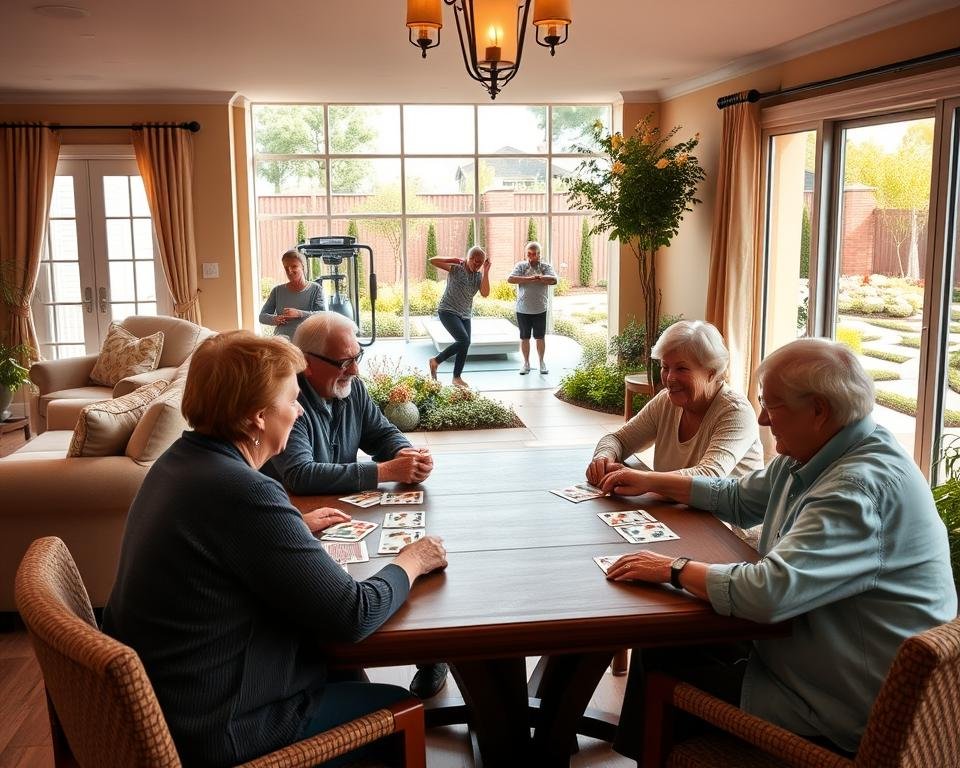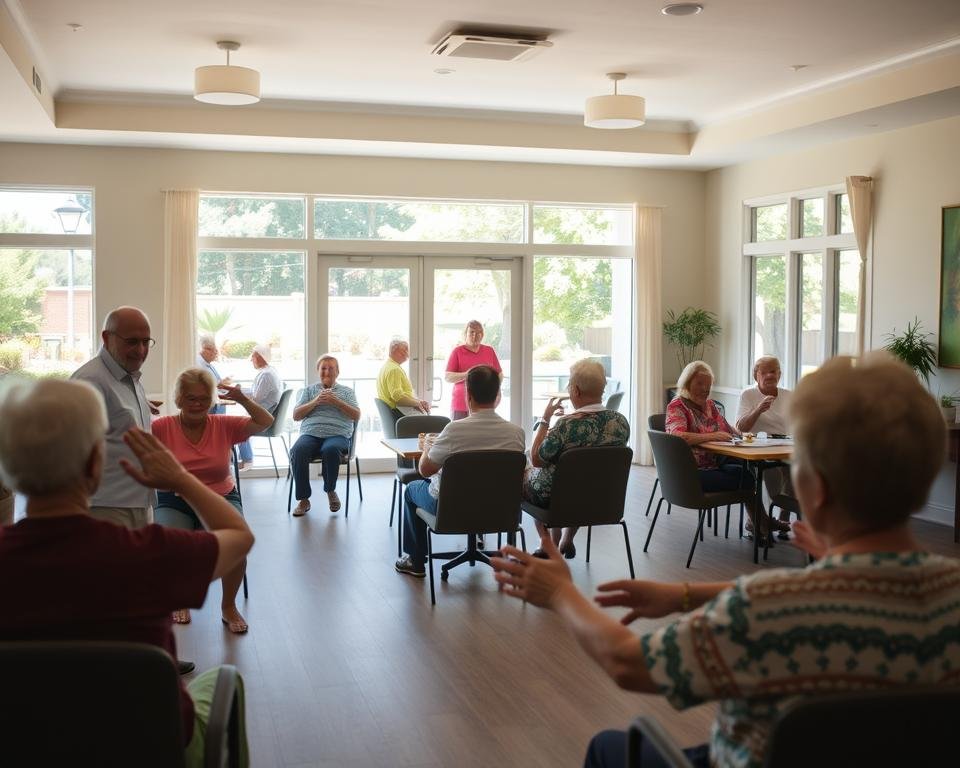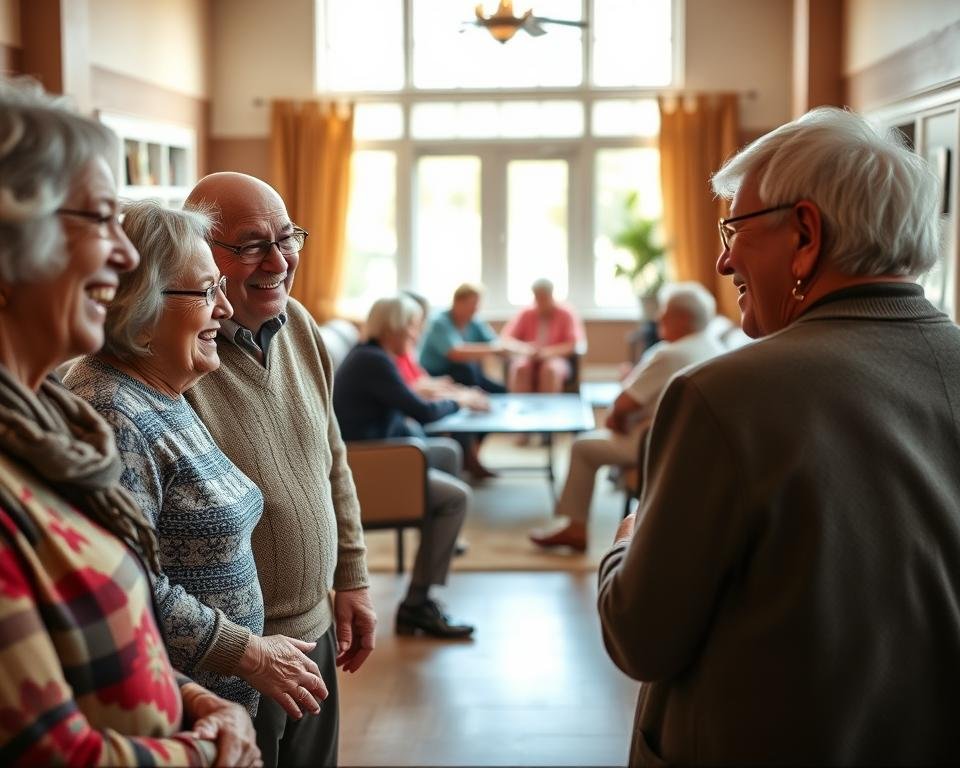“The greatest glory in living lies not in never falling, but in rising every time we fall.” – Nelson Mandela. This powerful quote resonates deeply, especially within assisted living environments where the focus is on empowering seniors to embrace vibrant, fulfilling lives. In today’s senior living communities, maintaining an active lifestyle is not just a goal but a fundamental part of the experience. These facilities provide a unique blend of personalized care and communal support, ensuring that all residents have the opportunity to stay physically, socially, and mentally engaged.
As you navigate the landscape of elderly care facilities, you’ll find that the emphasis on independence is paramount. Assisted living doesn’t only offer a safe environment; it promotes a lifestyle filled with companionship, wellness, and engaging activities tailored specifically for you. Programs designed to enhance physical fitness and social interaction help seniors thrive, making the transition into assisted living a positive journey towards renewed vitality. Many residents often find that the combination of structured activities and individualized support truly enriches their overall quality of life. To explore more about how these communities foster independence, visit senior independence in assisted living housing.
Key Takeaways
- Assisted living communities actively support resident engagement through various programs.
- Customized care promotes independence while addressing individual needs.
- Socialization is crucial for enhancing emotional well-being in seniors.
- Physical activities are tailored to encourage participation among residents.
- Nutrition and wellness programs ensure a balanced and healthy lifestyle.
Understanding Active Lifestyles in Assisted Living
An active lifestyle is vital for seniors. It includes physical fitness, mental stimulation, and social interaction. These aspects are crucial for improving health and happiness. Such a lifestyle helps maintain independence and pursue personal interests within senior living communities. These places often offer activities that help achieve these goals, ensuring a dynamic environment for their residents.
What Does an Active Lifestyle Mean for Seniors?
For seniors, an active lifestyle means engaging in activities that benefit the mind and body. It encompasses regular exercise, socializing, and learning new things. These activities, especially in elderly wellness programs, can reduce chronic disease risks. Assisted living environments are particularly supportive. They provide senior living amenities tailored to encourage an active way of life.
Key Benefits of Staying Active
Leading an active life has many advantages. Regular physical activity can enhance:
- Physical health and strength
- Cognitive function
- Emotional well-being
- Social connections
The World Health Organization affirms that it’s never too late to adopt healthy habits. Choosing the right senior living options can boost health and enjoyment in life. Assisted living communities provide support that encourages vitality. For guidance on making choices, visit what families should know before deciding on assisted living.

Physical Activities Available in Assisted Living
Assisted living offers a variety of physical activities for staying active and engaged. These cater to different interests and fitness levels, ensuring a balanced lifestyle. With assisted living services, seniors have access to activities that promote movement and social interactions.
Exercise Classes Tailored for Seniors
Senior-focused exercise classes are central to assisted living. Offerings may include chair yoga, water aerobics, or light strength training. These fitness programs for seniors are adapted to each individual’s abilities. This adaptation ensures everyone’s comfort and safety during participation.
Outdoor Activities and Group Outings
Nature is essential for an active lifestyle. Outdoor activities like visits to parks or museums encourage physical movement and provide fresh air. They also foster social bonds, making these experiences both enjoyable and revitalizing. For more adventures, explore senior living activities that include outdoor fun.
Walking Clubs and Fitness Challenges
Walking clubs are a great mix of exercise and socializing. They encourage seniors to walk together, building camaraderie. Fitness challenges offer additional motivation to remain active, fostering a competitive spirit. Regular participation in these activities boosts health and well-being.

Social Engagement and Its Impact on Health
For seniors, having strong social bonds is key to their overall health. Connecting with folks can lessen feelings of isolation. This often helps dodge various health issues. In assisted living communities, vibrant settings allow seniors to develop friendships and a support circle. Engaging in group events leads to meaningful interactions, improving mental health.
Importance of Socialization for Seniors
Socialization is vital for older adults to feel connected and appreciated. Interacting with others offers emotional support, fostering a sense of community. Active participation in social gatherings boosts mental resilience, enhancing emotional wellness. Such interactions lower the risk of depression and cognitive decline, fostering a longer, healthier life.
Group Activities and Clubs
Assisted living facilities provide various group activities for community engagement. Events like game nights, craft sessions, and book clubs offer excellent socialization opportunities. These endeavors not only promote friendship but also spark cognitive abilities and creativity, which are crucial for well-being.
Volunteering Opportunities Through Assisted Living
In assisted living communities, volunteering is a great way to strengthen social ties for seniors. Engaging in volunteer programs allows seniors to contribute to the community and connect with others who share similar values. Such peer support and shared experiences foster enduring friendships, enhancing daily life. For insights on how social engagement benefits seniors, visit this resource.

Nutrition and Wellness Support
Nutrition is key in enhancing your health and wellness in assisted living environments. Many facilities offer senior nutrition programs. These focus on providing healthy meal options that meet your dietary requirements. On-site dietitians work to customize your meals. They consider various dietary needs to ensure a well-balanced and nutritious diet.
Healthy Meal Plans and Diet Monitoring
Personalized meal plans are a core feature of dietary support in many assisted living communities. These plans are designed with your health in mind. They also promote a sense of community through shared meals. Eating with others fosters social connections and enriches the dining experience.
Nutrition Workshops and Cooking Classes
Dining experiences are complemented by engaging nutrition workshops and cooking classes. These programs enable you to explore healthy eating and cooking. They grant you autonomy over your diet while enhancing your overall well-being. Envision participating in classes that inspire creative, healthy cooking.
Personalizing Your Active Lifestyle Journey
Every resident in an assisted living community has unique preferences and needs. This makes exceptional individualized care crucial. To tailor your active lifestyle, collaborating closely with dedicated staff is key. Together, you can set personal goals that reflect your passions and interests. This strategy not only lets you play an active role in your daily life but empowers you with choice over your health and activities.
Setting Personal Goals and Plans
Effective senior lifestyle planning starts with identifying your core values. After that, establish specific objectives to reach your aspirations. Whether it involves joining a new fitness class or taking up a hobby, having clear goals supports personal growth. It nurtures your independence and sense of fulfillment.
Working with Staff to Stay Engaged
Staff play a crucial role in keeping your journey engaging. Ongoing discussions about your interests help them tailor activities that interest you. Collaborating with staff enhances your experience in the community. This reflects positively in the feedback from residents living in senior communities.
Feedback and Continuous Improvement
Keeping an open dialogue about your experiences is vital. Productive conversations about successes and areas for improvement help tailor your lifestyle plan. Assisted living focuses on aligning services with your needs and preferences, thanks to your feedback. This commitment to continuous improvement ensures your lifestyle meets your aspirations. For deeper insights on personalized care plans, explore this valuable resource.
